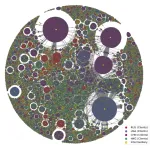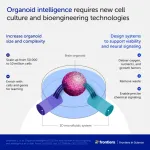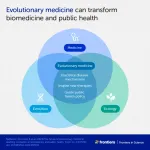(Press-News.org) COLUMBUS, Ohio – Immune cells that keep the brain free of debris but also contribute to inflammation are the likely culprits behind the concentration and memory problems that sometimes follow one type of chemotherapy, a new study in mice suggests.
Researchers previously showed that female mice given paclitaxel, a drug commonly used to treat breast, ovarian and other cancers, developed memory problems that were linked to inflammation in the brain. Mice receiving a placebo did not develop the “mental fog” phenomenon known as chemo brain.
In this study, the team used a technique to delete immune cells called microglia from the brains of mice that had received paclitaxel. The loss of those cells restored the chemo-treated animals’ memory and also lowered inflammation in their brains.
“That was the peak of the paper: We demonstrated that microglia were necessary for the cognitive impairments we’ve seen with paclitaxel – the behavior was reversed,” said senior author Leah Pyter, an investigator in the Institute for Behavioral Medicine Research at The Ohio State University.
“When we got rid of those microglia, it was associated with a reduction in the inflammatory response to chemo,” said Pyter, associate professor of psychiatry and behavioral health in Ohio State’s College of Medicine. “So we think that when microglia are activated and become pro-inflammatory, that’s what is ultimately affecting neurons to impair memory.”
The research was published online recently in the journal Brain, Behavior and Immunity.
In these studies, the mice never have cancer – the research is intended to study only the effects of paclitaxel, which is often combined with one or more additional drugs in regimens determined to provide the most effective treatment for certain types of breast cancer. A member of the Cancer Control Research Program, Pyter is also studying how the gut microbiome may play a role in chemo brain.
Identifying chemotherapy side effects, and the cells and pathways involved, in animal studies is a first step toward proposing potential interventions that could lessen the impact this important cancer treatment has on the body and brain. Chemotherapy agents work by killing cancer cells, but also kill other dividing cells, and the immune system clean-up of resulting debris is thought to drive inflammation, Pyter said.
The team predicts that inflammatory cells in the rest of the body, known as the periphery, are sending signals that activate microglia to become pro-inflammatory in the brain, and those signals interact with cells in the blood-brain barrier – hinting at three potential areas to target.
“We should always be trying to get to more targeted treatments. And the first step of that is to understand who the major players are,” Pyter said. “As we look for potential targets for intervention, we have to keep in mind that cancer patients need their peripheral immune systems intact to respond to tumor cells and get rid of them. So it’s tricky.”
In the new study, mice were given six cycles of paclitaxel injections or a placebo. Researchers found that both microglia and astrocytes, cells in the brain that have an immune role but also perform numerous functions to keep neurons healthy, were activated by the chemotherapy in the hippocampus, the region of focus in this work. Machine learning analysis showed that compared to mice that received a placebo, microglia in the brains of mice receiving chemo were producing more pro-inflammatory proteins and suppressing a protein important for cognition-related neuron health.
An experimental drug that inhibits a substance that microglia in mice need for survival was added to the animals’ food to deplete microglia in their brains. Chemo-treated mice with normal brain immune cell levels showed memory problems in a standard lab test. In contrast, memory in the mice with depleted microglia was restored, and chemo-induced pro-inflammatory proteins in their brains were significantly reduced.
Drugs similar to this experimental compound have been used in cancer patients receiving paclitaxel to target other types of immune cells, which suggests that temporarily clearing away microglia in humans may be feasible, Pyter said.
“We know that chemotherapy is lifesaving, but comes with the potential for toxicity. A better understanding of how chemotherapy affects the brain opens up research areas and interventions to improve the lives of our cancer patients,” said Dr. Peter Shields, deputy director of The Ohio State University Comprehensive Cancer Center and a practicing thoracic oncologist at The James Cancer Hospital and Solove Research Institute.
Pyter also said the findings hint at possible long-term cognitive effects from paclitaxel because microglia are unusual among immune cell types: They have a long life and don’t repopulate frequently.
“Microglia are always there – they’re very dynamic and they’re trolling for issues. They might look completely normal until they’re activated, and then their response to that activation can be very abnormal,” she said. “We’re using chemo as a hypothesized way to activate them. But say a cancer patient receives and finishes chemo. But later, they have surgery or a huge stressor in their life – that will reactivate those cells and they might respond oddly later in life.
“This model doesn’t mimic long-term side effects. But it is a big concern because many breast cancer patients survive, and the side effects don’t always go away.”
This research was supported by The Ohio State University Wexner Medical Center, a Postdoctoral Pelotonia Fellowship and the National Institutes of Health. Co-authors include Corena Grant, Kyle Sullivan, Kylie Wentworth, Lauren Otto, Lindsay Strehle and Jose Otero, all of Ohio State. Sullivan is also affiliated with Oak Ridge National Laboratory.
#
Contact: Leah Pyter, Leah.Pyter@osumc.edu
Written by Emily Caldwell, Caldwell.151@osu.edu
END
From astronomical sums of money to opulent superyachts and lavish villas, the assets of the oligarchs providing the political and financial backing for Russian president Vladimir Putin's military ambitions have been publicly and fervently seized by Western nations since Russia's invasion of Ukraine.
Yet, the invasion—now in its second year—remains largely unabated as Russia's moneyed elite challenge sanctions in court or simply dodge them.
But a new study led by Dartmouth College researchers exposes a massive vulnerability for the Kremlin's critical cadre of billionaires—the small, secretive network of financial experts ...
With the development of human space technology, planetary exploration has become one of the most important space exploration activities of mankind. As of December 2021, a total of 252 planetary probes have been launched around the world. The missions reveal the deep space to humankind. In the new paper published in the journal Space: Science & Technology, Yixin Sun et al review some advances in planetary science made by these missions in the past years.
1.Research Advances in Terrestrial Planets
1. ...
COLUMBUS, Ohio – Using data from the James Webb Space Telescope’s first year of interstellar observation, an international team of researchers was able to serendipitously view an exploding supernova in a faraway spiral galaxy.
The study, published recently in The Astrophysical Journal Letters, provides new infrared measurements of one of the brightest galaxies in our cosmic neighborhood, NGC 1566, also known as the Spanish Dancer. Located about 40 million miles away from Earth, the galaxy’s extremely active center has led it to become especially popular with scientists aiming to learn more about how star-forming nebulae form and evolve.
In this case, ...
Following a successful pilot study, an online anonymous treatment program aimed at reducing child sexual abuse by providing treatment to individuals who exhibit sexual urges towards children is being launched across the EU. It is now available in Swedish, German, and Portuguese as well as in an updated English version. The treatment program, which has been developed by researchers and psychologists at Karolinska Institutet in Sweden, will be evaluated within the framework of an international research collaboration funded by the EU.
"Sexual exploitation of children is a major problem within ...
PULLMAN, Wash – A liquid nitrogen spray developed by Washington State University researchers can remove almost all of the simulated moon dust from a space suit, potentially solving what is a significant challenge for future moon-landing astronauts.
The sprayer removed more than 98% of moon dust simulant in a vacuum environment with minimal damage to spacesuits, performing better than any techniques that have been investigated previously. The researchers report on their work in the journal, Acta Astronautica.
While people have managed ...
LEAWOOD, Kansas—Articles appearing in an Annals of Family Medicine special supplement published yesterday contain observations, insights, and ideas for advancing health care equity, promoting interprofessional collaboration, transforming education, and improving primary care practices.
The supplement, titled, “Advancing Primary Care through Research, Education and Practice: Work of the Health Resources and Services Administration–Supported Academic Units for Primary Care Training and Enhancement,” highlights activities of six HRSA-funded academic units for primary care training enhancement. ...
Not all pollution comes from people. When global temperatures increase by 4 degrees Celsius, harmful plant emissions and dust will also increase by as much as 14 percent, according to new UC Riverside research.
The research does not account for a simultaneous increase in human-made sources of air pollution, which has already been predicted by other studies.
“We are not looking at human emissions of air pollution, because we can change what we emit,” said James Gomez, UCR doctoral student and lead author of the study. “We can ...
Artificial intelligence (AI) has long been inspired by the human brain. This approach proved highly successful: AI boasts impressive achievements – from diagnosing medical conditions to composing poetry. Still, the original model continues to outperform machines in many ways. This is why, for example, we can ‘prove our humanity’ with trivial image tests online. What if instead of trying to make AI more brain-like, we went straight to the source?
Scientists across multiple disciplines ...
The word ‘evolution’ may bring to mind dusty dinosaur bones, but it impacts our health every day. For example, even though antibiotics were invented only a century ago, the evolution of antibiotic resistance is already a major concern. The rise in modern health problems such as obesity can also be traced back to evolutionary principles.
An article published in Frontiers in Science demonstrates how applying an evolutionary perspective to medicine can inspire new ways of preventing and treating disease.
“Evolutionary medicine holds promise to transform our understanding of why we get sick ...
Researchers from the Institute of Botany, Czech Academy of Sciences, described the symbiotic relationship between fungi and algae which science has largely overlooked until now. The coexistence of algae and corticioid basidiomycetes, which are common in temperate forests, has been given a new name: alcobiosis.
Jan Vondrák of the Department of Taxonomy, Institute of Botany, and the first author of the study says “Years ago, during field trips, we were repeatedly puzzled to find a layer of green algae where some of the fungal coatings on wood or bark (so-called corticioid fungi) are disturbed. We discovered that this is a ...





